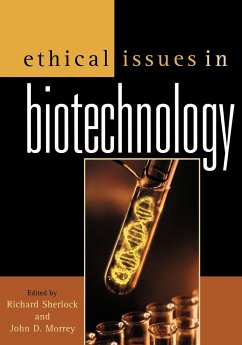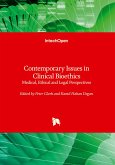Ethical Issues in Biotechnology
Herausgeber: Sherlock, Richard; Morrey, John D.
Ethical Issues in Biotechnology
Herausgeber: Sherlock, Richard; Morrey, John D.
- Broschiertes Buch
- Merkliste
- Auf die Merkliste
- Bewerten Bewerten
- Teilen
- Produkt teilen
- Produkterinnerung
- Produkterinnerung
Visit our website for sample chapters!
Andere Kunden interessierten sich auch für
![Ethical Issues in Drug Research Ethical Issues in Drug Research]() M. J. ParnhamEthical Issues in Drug Research83,99 €
M. J. ParnhamEthical Issues in Drug Research83,99 €![ETHICAL AND LEGAL ISSUES IN MODERN SURGERY ETHICAL AND LEGAL ISSUES IN MODERN SURGERY]() Vassilios Papalois Et Al Nadey HakimETHICAL AND LEGAL ISSUES IN MODERN SURGERY129,99 €
Vassilios Papalois Et Al Nadey HakimETHICAL AND LEGAL ISSUES IN MODERN SURGERY129,99 €![Contemporary Issues in Clinical Bioethics - Medical, Ethical and Legal Perspectives Contemporary Issues in Clinical Bioethics - Medical, Ethical and Legal Perspectives]() Contemporary Issues in Clinical Bioethics - Medical, Ethical and Legal Perspectives135,00 €
Contemporary Issues in Clinical Bioethics - Medical, Ethical and Legal Perspectives135,00 €![Ethical Issues in Cardiovascular Medicine Ethical Issues in Cardiovascular Medicine]() Ethical Issues in Cardiovascular Medicine180,99 €
Ethical Issues in Cardiovascular Medicine180,99 €![Ethical Issues in Biomedical Publication Ethical Issues in Biomedical Publication]() Ethical Issues in Biomedical Publication37,99 €
Ethical Issues in Biomedical Publication37,99 €![A Dialogue on Ethical Issues of Life and Death A Dialogue on Ethical Issues of Life and Death]() Rocco J. GennaroA Dialogue on Ethical Issues of Life and Death72,99 €
Rocco J. GennaroA Dialogue on Ethical Issues of Life and Death72,99 €![Emerging Conceptual, Ethical and Policy Issues in Bionanotechnology Emerging Conceptual, Ethical and Policy Issues in Bionanotechnology]() Emerging Conceptual, Ethical and Policy Issues in Bionanotechnology112,99 €
Emerging Conceptual, Ethical and Policy Issues in Bionanotechnology112,99 €-
-
-
Visit our website for sample chapters!
Hinweis: Dieser Artikel kann nur an eine deutsche Lieferadresse ausgeliefert werden.
Hinweis: Dieser Artikel kann nur an eine deutsche Lieferadresse ausgeliefert werden.
Produktdetails
- Produktdetails
- Verlag: Rowman & Littlefield Publishers
- Seitenzahl: 658
- Erscheinungstermin: 9. Oktober 2002
- Englisch
- Abmessung: 254mm x 178mm x 36mm
- Gewicht: 1217g
- ISBN-13: 9780742513778
- ISBN-10: 0742513777
- Artikelnr.: 28113044
- Herstellerkennzeichnung
- Libri GmbH
- Europaallee 1
- 36244 Bad Hersfeld
- gpsr@libri.de
- Verlag: Rowman & Littlefield Publishers
- Seitenzahl: 658
- Erscheinungstermin: 9. Oktober 2002
- Englisch
- Abmessung: 254mm x 178mm x 36mm
- Gewicht: 1217g
- ISBN-13: 9780742513778
- ISBN-10: 0742513777
- Artikelnr.: 28113044
- Herstellerkennzeichnung
- Libri GmbH
- Europaallee 1
- 36244 Bad Hersfeld
- gpsr@libri.de
Edited by Richard Sherlock and John D. Morrey - Contributions by Nicholas Agar; Miguel Altieri; American Association for the Advancement of Science; F H. Bach et. al; eds.; Coalition of Americans for Research Ethics; Carl Cohen; Ronnie Cummings; Joyce D'S
Chapter 1 Introduction Part 2 I. Fundamental Issues of Ethics and
Biotechnology Chapter 3 How to Assess the Consequences of Genetic
Engineering Chapter 4 Redesigning the World: Ethical Questions About
Genetic Engineering Chapter 5 "Playing God" and Invoking a Perspective
Chapter 6 Genetic Trespassing and Environmental Ethics Part 7 II.
Agricultural Biotechnology Chapter 8 Differing Views of the Benefits and
Risks of Agricultural Biotechnology Chapter 9 Risk and Risk Management
Chapter 10 Journey to the Origin: Biological Integrity and Agriculture
Chapter 11 Three Concepts of Genetic Trespassing Chapter 12 Ten Reasons Why
Biotechnology Will Be Important to the Developing World Chapter 13 Ten
Reasons Why Biotechnology Will Not Ensure Food Security, Protect the
Environment, or Reduce Poverty in the Developing World Part 14 III. Food
Biotechnology Chapter 15 The Scientific and Health Aspects of Genetically
Modified Foods: Rapporteurs' Summary Chapter 16 The Safety of Foods
Developed by Biotechnology Chapter 17 Hazards of Genetically Engineered
Foods and Crops: Why We Need a Global Moratorium Chapter 18 Why We Need
Labeling of Genetically Engineered Food Chapter 19 Ethical Issues in Food
Biotechnology Part 20 IV. Animal Biotechnology Chapter 21 A Critical View
of the Genetic Engineering of Farm Animals Chapter 22 The "Frankenstein
Thing": The Moral Impact of Genetic Engineering of Agricultural Animals on
Society and Future Science Chapter 23 On the Ethics of Using Animals for
Human Benefit Chapter 24 The Case for the Use of Animals in Biomedical
Research Chapter 25 Artificial Lives: Philosophical Dimensions of Farm
Animal Biotechnology Chapter 26 Genetic Engineering as Animal Slavery
Chapter 27 Uncertainty in Xenotransplantation: Individual Benefit versus
Collective Risk Chapter 28 Critical Ethical Issues in Clinical Trials with
Xenotransplants Part 29 V. Human Genetic Testing and Therapy Chapter 30
Social, Legal, and Ethical Implications of Genetic Testing Chapter 31
Genetic Links, Family Ties, and Social Bonds: Rights and Responsibilities
in the Face of Genetic Knowledge Chapter 32 Privacy and the Control of
Genetic Information Chapter 33 The Ethics of Somatic Cell Gene Therapy
Chapter 34 Human Inheritable Genetic Modifications: Assessing Scientific,
Ethical, Religious, and Policy Issues Chapter 35 Germ-Line Genetic
Engineering and Moral Diversity: Moral Controversies in a Post-Christian
World Part 36 VI. Human Cloning and Stem Cell Research Chapter 37 Human
Cloning: Report and Recommendations of the Natioanl Bioethics Advisory
Commission Chapter 38 The Wisdom of Repugnance Chapter 39 Genetic Encores:
The Ethics of Human Cloning Chapter 40 Stem Cell Research and Applications:
Findings and Recommendations Chapter 41 On Human Embryos and Stem Cell
Research: An Appeal for Legally and Ethically Responsible Science and
Public Policy Chapter 42 Suggestions for Further Study Chapter 43 Study
Cases
Biotechnology Chapter 3 How to Assess the Consequences of Genetic
Engineering Chapter 4 Redesigning the World: Ethical Questions About
Genetic Engineering Chapter 5 "Playing God" and Invoking a Perspective
Chapter 6 Genetic Trespassing and Environmental Ethics Part 7 II.
Agricultural Biotechnology Chapter 8 Differing Views of the Benefits and
Risks of Agricultural Biotechnology Chapter 9 Risk and Risk Management
Chapter 10 Journey to the Origin: Biological Integrity and Agriculture
Chapter 11 Three Concepts of Genetic Trespassing Chapter 12 Ten Reasons Why
Biotechnology Will Be Important to the Developing World Chapter 13 Ten
Reasons Why Biotechnology Will Not Ensure Food Security, Protect the
Environment, or Reduce Poverty in the Developing World Part 14 III. Food
Biotechnology Chapter 15 The Scientific and Health Aspects of Genetically
Modified Foods: Rapporteurs' Summary Chapter 16 The Safety of Foods
Developed by Biotechnology Chapter 17 Hazards of Genetically Engineered
Foods and Crops: Why We Need a Global Moratorium Chapter 18 Why We Need
Labeling of Genetically Engineered Food Chapter 19 Ethical Issues in Food
Biotechnology Part 20 IV. Animal Biotechnology Chapter 21 A Critical View
of the Genetic Engineering of Farm Animals Chapter 22 The "Frankenstein
Thing": The Moral Impact of Genetic Engineering of Agricultural Animals on
Society and Future Science Chapter 23 On the Ethics of Using Animals for
Human Benefit Chapter 24 The Case for the Use of Animals in Biomedical
Research Chapter 25 Artificial Lives: Philosophical Dimensions of Farm
Animal Biotechnology Chapter 26 Genetic Engineering as Animal Slavery
Chapter 27 Uncertainty in Xenotransplantation: Individual Benefit versus
Collective Risk Chapter 28 Critical Ethical Issues in Clinical Trials with
Xenotransplants Part 29 V. Human Genetic Testing and Therapy Chapter 30
Social, Legal, and Ethical Implications of Genetic Testing Chapter 31
Genetic Links, Family Ties, and Social Bonds: Rights and Responsibilities
in the Face of Genetic Knowledge Chapter 32 Privacy and the Control of
Genetic Information Chapter 33 The Ethics of Somatic Cell Gene Therapy
Chapter 34 Human Inheritable Genetic Modifications: Assessing Scientific,
Ethical, Religious, and Policy Issues Chapter 35 Germ-Line Genetic
Engineering and Moral Diversity: Moral Controversies in a Post-Christian
World Part 36 VI. Human Cloning and Stem Cell Research Chapter 37 Human
Cloning: Report and Recommendations of the Natioanl Bioethics Advisory
Commission Chapter 38 The Wisdom of Repugnance Chapter 39 Genetic Encores:
The Ethics of Human Cloning Chapter 40 Stem Cell Research and Applications:
Findings and Recommendations Chapter 41 On Human Embryos and Stem Cell
Research: An Appeal for Legally and Ethically Responsible Science and
Public Policy Chapter 42 Suggestions for Further Study Chapter 43 Study
Cases
Chapter 1 Introduction Part 2 I. Fundamental Issues of Ethics and
Biotechnology Chapter 3 How to Assess the Consequences of Genetic
Engineering Chapter 4 Redesigning the World: Ethical Questions About
Genetic Engineering Chapter 5 "Playing God" and Invoking a Perspective
Chapter 6 Genetic Trespassing and Environmental Ethics Part 7 II.
Agricultural Biotechnology Chapter 8 Differing Views of the Benefits and
Risks of Agricultural Biotechnology Chapter 9 Risk and Risk Management
Chapter 10 Journey to the Origin: Biological Integrity and Agriculture
Chapter 11 Three Concepts of Genetic Trespassing Chapter 12 Ten Reasons Why
Biotechnology Will Be Important to the Developing World Chapter 13 Ten
Reasons Why Biotechnology Will Not Ensure Food Security, Protect the
Environment, or Reduce Poverty in the Developing World Part 14 III. Food
Biotechnology Chapter 15 The Scientific and Health Aspects of Genetically
Modified Foods: Rapporteurs' Summary Chapter 16 The Safety of Foods
Developed by Biotechnology Chapter 17 Hazards of Genetically Engineered
Foods and Crops: Why We Need a Global Moratorium Chapter 18 Why We Need
Labeling of Genetically Engineered Food Chapter 19 Ethical Issues in Food
Biotechnology Part 20 IV. Animal Biotechnology Chapter 21 A Critical View
of the Genetic Engineering of Farm Animals Chapter 22 The "Frankenstein
Thing": The Moral Impact of Genetic Engineering of Agricultural Animals on
Society and Future Science Chapter 23 On the Ethics of Using Animals for
Human Benefit Chapter 24 The Case for the Use of Animals in Biomedical
Research Chapter 25 Artificial Lives: Philosophical Dimensions of Farm
Animal Biotechnology Chapter 26 Genetic Engineering as Animal Slavery
Chapter 27 Uncertainty in Xenotransplantation: Individual Benefit versus
Collective Risk Chapter 28 Critical Ethical Issues in Clinical Trials with
Xenotransplants Part 29 V. Human Genetic Testing and Therapy Chapter 30
Social, Legal, and Ethical Implications of Genetic Testing Chapter 31
Genetic Links, Family Ties, and Social Bonds: Rights and Responsibilities
in the Face of Genetic Knowledge Chapter 32 Privacy and the Control of
Genetic Information Chapter 33 The Ethics of Somatic Cell Gene Therapy
Chapter 34 Human Inheritable Genetic Modifications: Assessing Scientific,
Ethical, Religious, and Policy Issues Chapter 35 Germ-Line Genetic
Engineering and Moral Diversity: Moral Controversies in a Post-Christian
World Part 36 VI. Human Cloning and Stem Cell Research Chapter 37 Human
Cloning: Report and Recommendations of the Natioanl Bioethics Advisory
Commission Chapter 38 The Wisdom of Repugnance Chapter 39 Genetic Encores:
The Ethics of Human Cloning Chapter 40 Stem Cell Research and Applications:
Findings and Recommendations Chapter 41 On Human Embryos and Stem Cell
Research: An Appeal for Legally and Ethically Responsible Science and
Public Policy Chapter 42 Suggestions for Further Study Chapter 43 Study
Cases
Biotechnology Chapter 3 How to Assess the Consequences of Genetic
Engineering Chapter 4 Redesigning the World: Ethical Questions About
Genetic Engineering Chapter 5 "Playing God" and Invoking a Perspective
Chapter 6 Genetic Trespassing and Environmental Ethics Part 7 II.
Agricultural Biotechnology Chapter 8 Differing Views of the Benefits and
Risks of Agricultural Biotechnology Chapter 9 Risk and Risk Management
Chapter 10 Journey to the Origin: Biological Integrity and Agriculture
Chapter 11 Three Concepts of Genetic Trespassing Chapter 12 Ten Reasons Why
Biotechnology Will Be Important to the Developing World Chapter 13 Ten
Reasons Why Biotechnology Will Not Ensure Food Security, Protect the
Environment, or Reduce Poverty in the Developing World Part 14 III. Food
Biotechnology Chapter 15 The Scientific and Health Aspects of Genetically
Modified Foods: Rapporteurs' Summary Chapter 16 The Safety of Foods
Developed by Biotechnology Chapter 17 Hazards of Genetically Engineered
Foods and Crops: Why We Need a Global Moratorium Chapter 18 Why We Need
Labeling of Genetically Engineered Food Chapter 19 Ethical Issues in Food
Biotechnology Part 20 IV. Animal Biotechnology Chapter 21 A Critical View
of the Genetic Engineering of Farm Animals Chapter 22 The "Frankenstein
Thing": The Moral Impact of Genetic Engineering of Agricultural Animals on
Society and Future Science Chapter 23 On the Ethics of Using Animals for
Human Benefit Chapter 24 The Case for the Use of Animals in Biomedical
Research Chapter 25 Artificial Lives: Philosophical Dimensions of Farm
Animal Biotechnology Chapter 26 Genetic Engineering as Animal Slavery
Chapter 27 Uncertainty in Xenotransplantation: Individual Benefit versus
Collective Risk Chapter 28 Critical Ethical Issues in Clinical Trials with
Xenotransplants Part 29 V. Human Genetic Testing and Therapy Chapter 30
Social, Legal, and Ethical Implications of Genetic Testing Chapter 31
Genetic Links, Family Ties, and Social Bonds: Rights and Responsibilities
in the Face of Genetic Knowledge Chapter 32 Privacy and the Control of
Genetic Information Chapter 33 The Ethics of Somatic Cell Gene Therapy
Chapter 34 Human Inheritable Genetic Modifications: Assessing Scientific,
Ethical, Religious, and Policy Issues Chapter 35 Germ-Line Genetic
Engineering and Moral Diversity: Moral Controversies in a Post-Christian
World Part 36 VI. Human Cloning and Stem Cell Research Chapter 37 Human
Cloning: Report and Recommendations of the Natioanl Bioethics Advisory
Commission Chapter 38 The Wisdom of Repugnance Chapter 39 Genetic Encores:
The Ethics of Human Cloning Chapter 40 Stem Cell Research and Applications:
Findings and Recommendations Chapter 41 On Human Embryos and Stem Cell
Research: An Appeal for Legally and Ethically Responsible Science and
Public Policy Chapter 42 Suggestions for Further Study Chapter 43 Study
Cases









